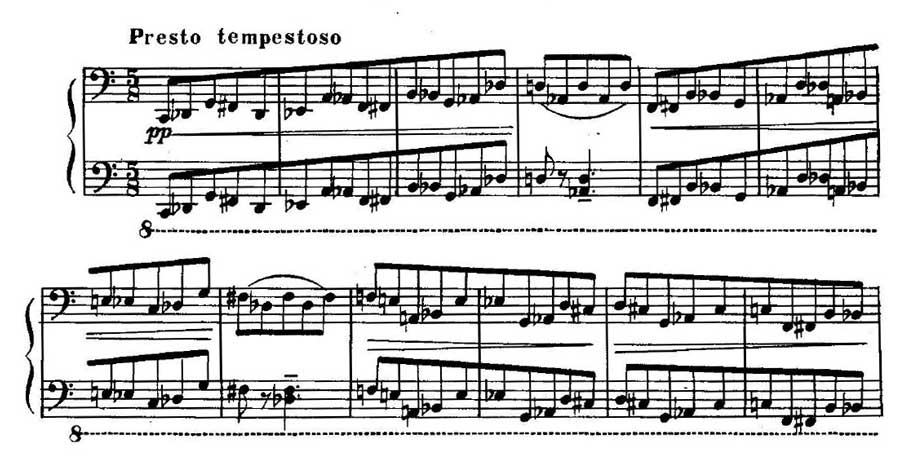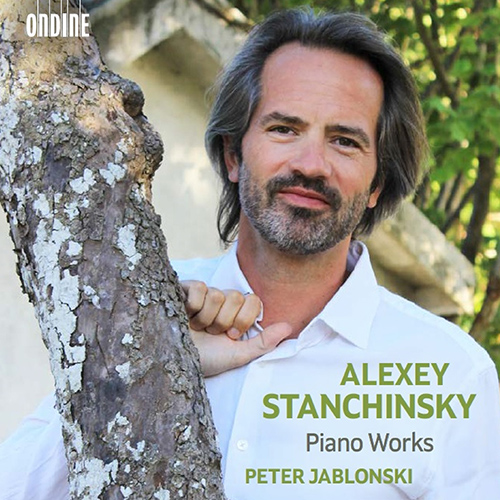Stanchinsky is Gramophone’s Editor’s Choice
The short-lived Russian pianist and composer Alexey Stanchinsky was playing in public by age six and was highly regarded in all the musical activities he undertook. Swedish pianist Peter Jablonski has recorded an album with selected Stanchinsky works for the Ondine label, a recording that was recently selected as Gramophone’s Editor’s Choice of May 2021. Piano Street talked to Jablonski about the young forgotten composer and his works.
 Piano Street: Congratulations on your Stanchinsky recording for Ondine being selected as Gramophone’s Editor’s Choice of May 2021! You have always nourished an interest in intriguing repertoire and your recording of the seldom heard Scriabin Mazurkas gained great acclaim. How did you find Alexei Stanchinsky, the young Russian, who died at 26?
Piano Street: Congratulations on your Stanchinsky recording for Ondine being selected as Gramophone’s Editor’s Choice of May 2021! You have always nourished an interest in intriguing repertoire and your recording of the seldom heard Scriabin Mazurkas gained great acclaim. How did you find Alexei Stanchinsky, the young Russian, who died at 26?
Peter Jablonski: My partner Anastasia, who is a musicologist specialising in Russian music, told me about Stanchinsky and his connection to Scriabin, Taneyev, and Moscow. She then gave me the score of his Nocturne, and when I played it through, I was immediately hooked—the music sounded so fresh, so original and so different from most of what I played before; it simply captivated me and pushed me to get to know his music further.
PS: You are well documented in Russian and Soviet composers’ repertoire. What stands out in Stanchinskiy’s works and what do find being intriguing?
PJ: The most intriguing for me is the versatile, and the power of his talent, which was burning such a short time. What he achieved in 10 years of his entire creative life is astonishing. His music combines so many things: folk-like elements, complex polyphony, full-blooded Russian broodiness and gloominess, and also humour, grace, and great sincerity.
Hear Peter Jablonski perform Stanchinsky’s Sketch no. 3:

PS: What can you say about his production of piano works which started in 1905, the forms and stylistic development until his early death?
PJ: I spent a lot of time carefully making the selection of Stanchinsky’s works for the recording, because I wanted to give a well-rounded picture of the originality and many facets of his creative talent and also the works that I felt a direct connection to. Like so many of his colleagues at the time, he begins by being inspired by Chopin, and also by Scriabin; his early works are very melody and harmony driven and lyrical. The Piano Sonata in E-flat minor (he composed two more after this) is an early work, displaying a lot of passion, character, melodic invention, and harmonic complexity. It is also rather demanding and awkwardly written pianistically! There are many instances where the score is ambiguous about notes and tempo, so one has to navigate the score with care. The bravura is always secondary to the musical message and the passion is burning intensely from within not in a brazen outwardly fashion. The Preludes are real character studies where despite his tender age, Stanchinsky shows real mastery at creating moods and distinct characters in the space of only a few bars, not unlike Grieg who was another early influence of Stanchinsky’s. These are perhaps the works that also clearly show his connection to the pianistic tradition of Scriabin and somewhat also Rachmaninoff. My passion for, and interest in the Mazurka genre are probably quite well known, so of course I had to take both Stanchinsky’s Mazurkas. Both mazurkas show clear influences of Chopin and the wonderful lilting quality of the rhythms are clearly there. They make me wonder if Szymanowski knew them as they seem to be a clear bridge between Chopin and Szymanowski. As character pieces the 15 Sketches (originally his Op. 1), are perhaps the most inventive and daring, with everything from slow lyricism to pianistic pyrotechnics in them. They were so good that they even made Prokofiev jealous! Songs Without Words are in the best song-like, lyrical tradition of Russian folk music, and are very simple without being simplistic. Again, we hear similarities with Grieg here.
Stanchinsky’s Nocturne was a real surprise to me. First of all, it seems to be written in a format that we meet often in Chopin, for example, with lyrical outer parts and a stormy middle section. But, in Stanchinsky’s nocturne the middle section is so unusual pianistically, I could say it is outstanding it its technical challenges, the writing is a bit awkward, like in the Sonata in E-flat minor, and because of that, it is easy to lose track of the fantastic music within.
The Variations are one of the most unusual, I would say, and intriguing work on this recording. Their outward simplicity and clarity are almost medieval, and show Stanchinsky’s interest in early music, which developed into his complete obsession with Bach and horrifically complex polyphonic writing later on.
To summarise my view of Stanchinsky’s music is quite easy—it is a composer so unique, who is his short 10 years of creative life managed to create works so diverse and so complex, one can only but wonder about, and be sorry for the fact that his life did not last longer for him to share with us the full extend of his extraordinary musical talent.
PS: He was said to wanting to take consultation from Nikolai Medtner in the end of his life. Can we see a musical connection there?
PJ: The connection between Medtner and Stanchinsky is easy to establish: both were influenced by and taught by the same man: Sergey Taneyev, who developed their interest in counterpoint. So, both composers have an epic, story-telling element in their music, and both were masters of counterpoint.
This feature is available for Gold members of pianostreet.com

Play album >>
Listen to Gramophones podcast:
Peter Jablonski on the piano music of Alexei Stanchinsky
Comments
great. yet another young talent writing wonderful music then somehow running astray and writing tuneless drivel instead of continuing on the path of beauty. why did this happen to so many composers at the turn of the last century? yes, i’ll admit to some originality here, perhaps it will grow on repeated listens. i’m surprised to learn he took inspiration from grieg, the most uninteresting and unoriginal composer in existence.
Strongly disagree with previous commenter. The late music is very interesting and a treat to discover.
Wow what a find!!! Had never heard of this composer. I had a look at the Nocturne and it’s fabulous music. I can understand why Jablonski was hooked. Congratulations on the recording.